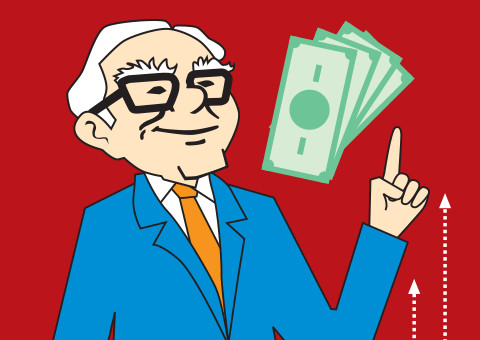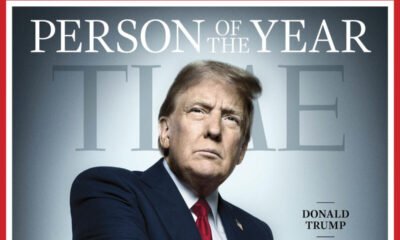Business
Warren Buffett’s Massive Cash Hoard Sparks Market Jitters—But Here’s Why You Shouldn’t Panic
Published
4 hours agoon

Warren Buffett, the legendary investor and CEO of Berkshire Hathaway, has once again left the financial world intrigued. His latest annual letter revealed that Berkshire has been on a selling spree, unloading stocks for the ninth consecutive quarter and amassing a record cash pile of $334 billion. Yet, in classic Buffett fashion, he offered little in the way of an explanation. This has left investors wondering – is he signaling distress, or is there a deeper strategy at play? More importantly, should everyday investors be concerned?
Buffett, at 94 years old, has built a reputation for his astute investment decisions. Over nearly six decades at the helm of Berkshire Hathaway, he has delivered a remarkable compound annual return of 20%, an enviable track record by any measure. But his recent moves—selling more than $134 billion worth of equities, particularly trimming positions in Apple and Bank of America—seem out of sync with the roaring bull market.
Adding to the mystery, Berkshire has halted stock buybacks despite reporting a significant rise in operating earnings. For a man who famously advised investors to be greedy when others are fearful, his cash-hoarding behavior raises questions.
No Love Lost for Equities
Buffett, however, insists that his stance does not indicate a loss of faith in stocks.
“Despite what some commentators currently view as an extraordinary cash position at Berkshire, the great majority of your money remains in equities,” he reassured shareholders in the annual letter. “That preference won’t change.”
This declaration seems at odds with his continued stock sales, but it does illustrate a key Buffett principle – he doesn’t buy for the sake of buying. Instead, he waits for what he calls ‘compelling’ opportunities.
A Market Too Expensive?
One possible explanation for Buffett’s strategy could be valuation concerns. In his letter, he hinted at the challenge of finding worthwhile investments in an overheated market:
“Often, nothing looks compelling; very infrequently we find ourselves knee-deep in opportunities.”
With the S&P 500 rallying more than 20% in each of the last two years, it’s possible that Buffett simply sees too few attractive buying opportunities. Historically, he has been vocal about avoiding overpriced stocks, preferring to wait for the right moment rather than chasing gains.

Positioning for the Future
Another theory gaining traction is that Buffett is setting the stage for his successor, Greg Abel. As Abel prepares to take the reins, Buffett may be restructuring Berkshire’s portfolio—paring down oversized positions and accumulating cash that Abel can deploy in the future. Buffett even drew a comparison between Abel and the late Charlie Munger, reinforcing confidence in his investment acumen.
Some investors see this as a prudent move rather than a cause for alarm. Having a war chest of $334 billion means Berkshire will be well-positioned to pounce on opportunities when the market eventually corrects.
Japanese Trading Houses
Despite trimming U.S. equity positions, Buffett did hint at one area where he plans to increase investments: Japanese trading houses. Nearly six years ago, Berkshire began buying stakes in five major Japanese trading firms, and Buffett signaled in the letter that these positions would likely grow further over time.
This aligns with his long-held strategy of investing in solid businesses with strong fundamentals at reasonable prices. While U.S. stocks may appear overpriced, Buffett clearly sees long-term potential in Japan.
Amid fears of a recession, it’s helpful to note that Buffett doesn’t sell due to economic conditions or predictions.
Warren Buffett’s cautious approach aligns with a year of strong stock market performance driven by optimism about a smooth economic recovery, easing inflation, and potential interest rate cuts by the Federal Reserve. However, recent trends, such as the 10-year Treasury yield surpassing 4% last month, suggest interest rates have not consistently followed expectations.
Other well-known investors have expressed concerns about the rising fiscal deficit. Buffett hinted he sold some stock holdings thinking that tax rates on capital gains would be increased to help with the growing deficit.
For Investors
Warren Buffett has headed into 2025 with the biggest cash position in more than 30 years! That alone has set Wall Street abuzz with speculation. Sitting on so much cash—north of $157 billion, to be precise—has obviously got investors in a tizzy.
The big questions they’re asking:
- Does he know something that we don’t?
- Should investors be worried? Should they, too, start sitting on more cash?
- If Buffett is being cautious, does that mean the market is in trouble?
On the surface, it does seem concerning—Buffett’s Berkshire Hathaway is hoarding cash at historic levels. Typically, Berkshire holds around 13% of its portfolio in cash, but now it’s hitting record highs. But here’s what many people are missing – Buffett isn’t just sitting on cash because he’s afraid of the market. Berkshire Hathaway still has around $350 billion invested in stocks. The company is merely being more selective about where and how they invest.

But before you rush to copy Buffett’s cash strategy, consider these three major differences between Warren Buffett’s portfolio and the average retirement portfolio –
1) Berkshire Hathaway Is an Insurance Giant—It Needs Cash for Payouts
Most people think of Berkshire Hathaway as a stock-picking empire, but at its core, it’s primarily an insurance business. That means Berkshire always needs to have substantial cash reserves to cover potential insurance payouts. Buffett himself has said that they need at least $30 billion in cash reserves just to meet insurance obligations, but some analysts suggest that this number should be at least $80 billion to handle worst-case scenarios.
Let’s put this into perspective. In 2017, Hurricane Harvey, Irma, and Maria resulted in over $130 billion in insurance claims. If another catastrophe were to hit, Berkshire needs to be prepared with billions in liquidity. So, part of Buffett’s massive cash pile isn’t about market fears—it’s about being responsible for an insurance empire.
2) When Buffett Invests, He Needs Big Moves—Not Small Bets
Unlike a regular investor who can easily buy a handful of shares in a promising company, Buffett operates on an entirely different scale. When Berkshire Hathaway makes an investment, it’s not about buying a few thousand or even a few million dollars worth of stock—it often means buying entire companies or making billion-dollar bets.
To put it in perspective: Berkshire Hathaway is a $900 billion company. If Buffett were to buy just $1 million worth of stock, it would be the equivalent of an average millionaire investing $1.70. That’s peanuts. For Berkshire’s portfolio to see a meaningful impact, it has to invest billions at a time, and the right opportunities to deploy that kind of capital don’t come around often. So when valuations get too high or there aren’t enough worthwhile opportunities, Buffett would rather sit on cash and wait.
3) Buffett’s Timeline vs. the Average Investor’s Timeline
One of the biggest mistakes retail investors make is trying to copy Buffett’s strategy without understanding that his investment timeline is completely different. Berkshire Hathaway is a conglomerate built to last forever, while most retirement portfolios are designed to last 20–30 years (or as long as the investor is alive).
This difference is crucial. Buffett can afford to wait years, even decades for the perfect opportunity, whereas the average investor may not have that kind of time. If you’re in your 30s or 40s, sitting on cash for a few years might be fine, but if you’re nearing retirement, waiting too long could mean missing out on crucial growth years.

So, Should You Copy Buffett’s Cash Strategy?
The short answer? Not necessarily.
While it’s always smart to have some cash on hand—especially during uncertain economic times—Buffett’s massive cash position is largely due to the nature of his business, the scale of his investments, and his ultra-long investment horizon.
For everyday investors, the better approach is to maintain a balanced strategy – Keep enough cash for emergencies and short-term needs. Be selective with investments, but don’t avoid the market entirely. Diversify your portfolio with a mix of stocks, bonds, and other assets.
Buffett’s strategy works for Berkshire Hathaway because of its size and structure. For the average investor, sitting on too much cash could mean missing out on long-term growth.
The Last Bit
Warren Buffett’s decision to sell stocks and hold more cash may puzzle some, but history suggests there’s a method to the madness. His reluctance to invest in a pricey market, combined with preparations for leadership transition, points to a long-term strategy rather than a sign of distress.
The key takeaway? Learn from Buffett’s patience and discipline, but make sure your strategy aligns with your personal financial goals and timeline.
You may like
-


Why Are Japanese Companies Not Happy With Trump? How Trump 2.0 Is Shaking The World Into A ‘Rude’ Awakening?
-


Singapore Economy On A High. Annual GDP Expands At Fastest Pace Since 2021. Asian Markets Mixed Bag Reaction To Trump’s Reciprocal Tariffs
-


Brutal Selloff In India’s Stock Market. What’s The Ideal Position – Buy Or Sell? Will IPO Euphoria Fizzle Out In 2025?
-


The Stock Market’s Cracking—And It’s Not Pretty. FIIs Exodus But Analysts Sight Long Term Potential Despite Rs 32,00,000 Core Investor Wealth Gone In 2025. What Is The Bear-ish Deal Here?
-


FII Selling Records Colossal Rs 50,000 Crore This Month. How Bad Can It Get? A Lot, Curtsey Trump Administration
-


US And Japan Announce Toughest Sanctions Yet On Russian Oil, Aiming To Cripple Moscow’s War Chest
